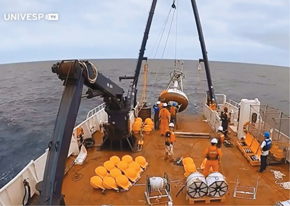
SP PESQUISAScenes from two of the SP Pesquisa programs SP PESQUISA
from Agência FAPESP
TV Cultura debuted a new show on March 7, 2015 that offers a behind-the-scenes look at scientific production taking place in São Paulo in a wide variety of fields. The show SP Pesquisa is the fruit of a cooperation agreement signed between FAPESP and the Padre Anchieta Foundation, responsible for TV Cultura. The show airs the work of researchers at institutions in São Paulo and reveals the relationship between research studies and the public’s daily routines, using easy-to-understand visual aids to illustrate concepts related to the fields discussed.
Twenty-six 28-minute episodes have been produced. They will air Saturdays on TV Cultura, and Sundays and Thursdays on Univesp TV, which is open digital channel 2.2 integrated with the Virtual University of São Paulo (Univesp). A television equipped with a digital converter is needed to watch the channel, which is part of TV Cultura’s digital multiprogramming.
To FAPESP President Celso Lafer, the partnership is proof of the interests shared by the institutions involved in the social-development-through-science initiative. “One of FAPESP’s missions is to promote to the public the results of research that supports, as well as underscores, the importance of knowledge in the search for solutions to society’s ills,” he says. “We believe this program is a very important component in the framework of activities under the Padre Anchieta Foundation because it adds real substance to this aspect of FAPESP’s mission.”
 SP PESQUISAScientists as protagonists
SP PESQUISAScientists as protagonists
The 26 episodes that have already been produced include a variety of fields. The show’s particular approach places a priority on the work of researchers and their daily routines in the places where the studies are being carried out, featuring reports from laboratories and other places.
In each episode, the scientists themselves discuss their research studies and how the studies could have an impact on daily life. “The idea is to establish a dialogue between the researcher and the viewers, demystifying the public perception of science and scientists,” says Valesca Canabarro Dios, the show’s director.
The first episode in the series presented research studies carried out at the University of Campinas (Unicamp) and the Federal University of São Paulo (Unifesp) on intestinal microbiota and their relationship to obesity and other diseases. Researchers from the two institutions along with physicians and other professionals associated with the field shared their scientific viewpoints about the topic and the findings of their work, while the program described the activity of the intestinal flora and their importance in the body’s functioning.
Segments with visual aids and a language accessible to a variety of audiences help explain the concepts covered in the studies. In the segment “Grifo nosso” (Emphasis added), journalist Salvador Nogueira reports, for example, how vaccines work in the human body or why bacteria are so important for digestion and other body functions.
 SP PESQUISAAll the explanations have been developed in collaboration with the researchers consulted for the show. The scientists also take part in designing the visual aids to be used in order to ensure that even with a certain amount of artistic liberty they remain faithful to the ideas covered.
SP PESQUISAAll the explanations have been developed in collaboration with the researchers consulted for the show. The scientists also take part in designing the visual aids to be used in order to ensure that even with a certain amount of artistic liberty they remain faithful to the ideas covered.
In addition to the informative way that the show addresses the mysteries of science that the research studies attempt to shed light on, it attempts to demystify the work that scientists do. The segment known as “Profissão” (Profession) follows the daily routine of the professionals in the groups heading up the studies discussed on the day’s show, explaining what they do and how they conduct their studies in laboratories and other places.
The researchers also discuss recent breakthroughs that they have had and talk about scientific papers published in high-impact journals.
The shows deal with research studies carried out in the state of São Paulo that have had significant findings in various fields – among them, sub-atomic particle physics, astrophysics, geophysics of the Brazilian sub-soil, nanomaterials, paleontology, urban studies, oceanography, biodiversity, ethanol, global warming, agriculture, vaccines for AIDS and health in general.
The scripts were written together by Univesp TV and Itinerante Filmes, the producer hired by the institutions based on FAPESP’s science communication efforts. “We follow the work of the Pesquisa FAPESP magazine and Agência FAPESP to select topics of interest and determine which researchers to contact,” says program director Valesca Dios.
SP Pesquisa airs Saturdays at 4:00 pm on TV Cultura. On Univesp TV, the program will air at 7:00 pm Sundays and 9:30 pm Thursdays.
Republish
